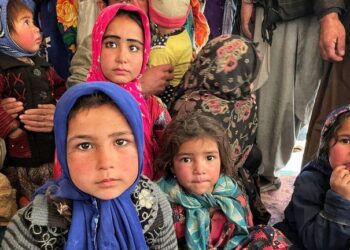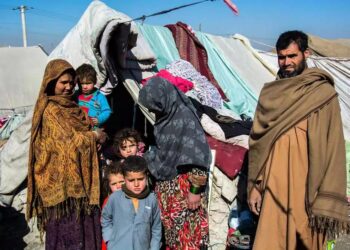World Environment Day 2024 casts a stark spotlight on Afghanistan, a nation grappling with the severe consequences of the escalating climate crisis. As temperatures rise and weather patterns grow increasingly erratic, Afghanistan faces devastating impacts on its agriculture, water resources, and vulnerable communities. This Hasht-e Subh Daily report delves into how climate change is intensifying the country’s environmental challenges, threatening livelihoods and underscoring the urgent need for comprehensive action both domestically and internationally.
World Environment Day Highlights Afghanistan’s Growing Climate Challenges
Afghanistan continues to grapple with the escalating impacts of climate change, as extreme weather events disrupt the livelihoods of millions across the country. Recent reports indicate a sharp increase in drought frequency, unseasonal floods, and prolonged heatwaves, which have taken a heavy toll on agriculture, water resources, and rural communities. The fragile ecosystem, already stressed by decades of conflict, is now further vulnerable to environmental degradation and resource scarcity, raising alarms among policymakers and humanitarian organizations alike.
Experts attribute these accelerating challenges to a combination of geographic vulnerability and inadequate infrastructure, emphasizing the urgent need for adaptive measures. Key climate-related issues currently facing Afghanistan include:
- Water scarcity: Depletion of natural water reserves threatening food security.
- Soil erosion: Loss of arable land amid erratic rainfall patterns.
- Glacial melt: Accelerated retreat of mountain glaciers impacting river flows.
- Urban heat islands: Rising temperatures in densely populated areas.
| Climate Impact | Regions Most Affected | Population at Risk (Millions) |
|---|---|---|
| Droughts | Hirat, Kandahar, Helmand | 7.5 |
| Floods | Badakhshan, Nangarhar | 2.3 |
| Heatwaves | Kabul, Jalalabad | 4.1 |
Rising Temperatures and Water Scarcity Threaten Afghan Agriculture and Livelihoods
Afghanistan’s agricultural sector, the backbone of its economy and the main source of livelihood for over 60% of its population, is facing unprecedented challenges due to soaring temperatures and worsening water scarcity. Prolonged droughts have become more frequent, severely reducing water availability for crops and livestock, while glacial melt in the Hindu Kush mountains disrupts the natural river flow. Farmers report lower yields and increasing crop failures, which have triggered food insecurity and aggravated poverty in rural areas already strained by conflict and displacement.
Key climate impacts affecting Afghan agriculture include:
- Decline in surface and groundwater levels
- Shifts in planting seasons and crop viability
- Increased soil degradation and desertification
| Region | Average Temperature Rise (°C) | Water Availability Decline (%) | Crop Yield Reduction (%) |
|---|---|---|---|
| Kandahar | 2.3 | 40 | 35 |
| Herat | 2.1 | 37 | 30 |
| Bamyan | 1.8 | 25 | 20 |
| Badakhshan | 1.9 | 30 | 28 |
Experts warn that without urgent adaptive strategies and increased investment in water management and climate-resilient farming techniques, millions of Afghans could face worsening economic hardship. The interplay of environmental stressors and limited infrastructure leaves rural communities vulnerable to food shortages and migration pressures, highlighting the critical need for coordinated efforts between national authorities, international partners, and local farmers.
Urgent Policy Reforms and Community Engagement Crucial for Climate Resilience in Afghanistan
Afghanistan’s vulnerability to climate change has reached a critical tipping point, demanding immediate and comprehensive reforms in national policies. Without urgent action, rising temperatures, erratic rainfall patterns, and increasing droughts threaten not only the environment but also livelihoods and food security for millions. Experts argue that existing frameworks lack the adaptability and enforcement mechanisms needed to tackle the multifaceted climate challenges. Strengthening legislation on sustainable water management, renewable energy adoption, and forest conservation has become imperative to enhance resilience at both local and national levels.
In parallel, the role of community engagement is paramount. Empowering local populations through education and participatory decision-making processes ensures that climate policies are grounded in reality and respond directly to vulnerable groups’ needs. Grassroots initiatives focusing on soil preservation, reforestation, and smart agriculture practices have demonstrated promising results but require more institutional support. Below is a breakdown of key areas where collaborative efforts can drive meaningful change:
- Water Resource Management: Community-led water conservation projects to counteract scarcity.
- Renewable Energy: Incentives for solar and wind energy installations in rural areas.
- Climate Education: Programs aimed at increasing awareness among youth and farmers.
- Disaster Preparedness: Local training on early warning systems and emergency response.
| Area | Community Role | Policy Need |
|---|---|---|
| Water Security | Rainwater harvesting, irrigation management | Regulations promoting sustainable usage |
| Forestry | Reforestation, anti-logging patrols | Protection of natural reserves |
| Agriculture | Climate-smart seeds, soil conservation | Subsidies for sustainable farming |
Final Thoughts
As Afghanistan grapples with the intensifying effects of the climate crisis, the observations made on World Environment Day underscore the urgent need for both national resilience and international support. With droughts, floods, and extreme weather events increasingly threatening livelihoods and stability, experts and citizens alike call for comprehensive strategies to address environmental degradation. Moving forward, Afghanistan’s path to sustainability will depend not only on immediate humanitarian aid but also on long-term commitments to climate adaptation and mitigation. The world’s attention on this critical issue remains essential as Afghanistan faces the daunting challenges ahead.

















